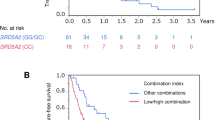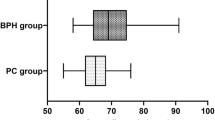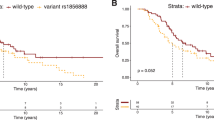Abstract
Genetic polymorphism in YB-1 was previously shown to be associated with the prognosis of advanced prostate cancer patients treated with primary androgen-deprivation therapy. However, the significance of this polymorphism remains invalidated. In this study, we aimed to validate the prognostic significance of the YB-1 genetic polymorphism in metastatic prostate cancer. This study included 79 Japanese patients who were diagnosed as metastatic prostate cancer between 2000 and 2016. Genomic DNA was obtained from patient whole blood samples, and genotyping on YB-1 (rs12030724) was performed by PCR-based technique. The association of genotype in YB-1 with clinicopathological parameters and oncological outcome, including progression-free survival and overall survival, was examined. Homozygous wild-type (AA), heterozygous variant (AT), and homozygous variant (TT) were identified in 47 (59.5%), 26 (32.9%) and 6 patients (7.6%), respectively. Heterozygous/homozygous variant (AT/TT) in YB-1 was significantly associated with lower progression risk compared with homozygous wild-type (AA) (hazard ratio = 0.52; 95% confidence interval = 0.30–0.88, P = 0.015). Consistent with this finding, heterozygous/homozygous variant (AT/TT) in YB-1 was significantly associated with lower risk of any-cause mortality compared with homozygous wild-type (AA) (hazard ratio = 0.46; 95% confidence interval = 0.21–0.93, P = 0.031). Gene polymorphism in YB-1 rs12030724 was validated to be a promising predictive biomarker of androgen-deprivation therapy in metastatic prostate cancer to identify patients requiring more intensive therapeutics.
This is a preview of subscription content, access via your institution
Access options
Subscribe to this journal
Receive 6 print issues and online access
$259.00 per year
only $43.17 per issue
Buy this article
- Purchase on Springer Link
- Instant access to full article PDF
Prices may be subject to local taxes which are calculated during checkout

Similar content being viewed by others
References
Shiota M, Eto M. Current status of primary pharmacotherapy and future perspectives toward upfront therapy for metastatic hormone-sensitive prostate cancer. Int J Urol. 2016;23:360–9.
Fujimoto N, Shiota M, Tomisaki I, Minato A. Gene polymorphism-related individual and interracial differences in the outcomes of androgen deprivation therapy for prostate cancer. Clin Genitourin Cancer. 2017;15:337–42.
Kohno K, Izumi H, Uchiumi T, Ashizuka M, Kuwano M. The pleiotropic functions of the Y-box-binding protein, YB-1. Bioessays. 2003;25:691–8.
Kuwano M, Oda Y, Izumi H, Yang SJ, Uchiumi T, Iwamoto Y, et al. The role of nuclear Y-box binding protein 1 as a global marker in drug resistance. Mol Cancer Ther. 2004;3:1485–92.
Shiota M, Fujimoto N, Imada K, Yokomizo A, Itsumi M, Takeuchi A, et al. Potential role for YB-1 in castration-resistant prostate cancer and resistance to enzalutamide through the androgen receptor V7. J Natl Cancer Inst. 2016;108:djw005.
Giménez-Bonafé P, Fedoruk MN, Whitmore TG, Akbari M, Ralph JL, Ettinger S, et al. YB-1 is upregulated during prostate cancer tumor progression and increases P-glycoprotein activity. Prostate. 2004;59:337–49.
Shiota M, Takeuchi A, Song Y, Yokomizo A, Kashiwagi E, Uchiumi T, et al. Y-box binding protein-1 promotes castration-resistant prostate cancer growth via androgen receptor expression. Endocr Relat Cancer. 2011;18:505–17.
Imada K, Shiota M, Kohashi K, Kuroiwa K, Song Y, Sugimoto M, et al. Mutual regulation between Raf/MEK/ERK signaling and Y-box-binding protein-1 promotes prostate cancer progression. Clin Cancer Res. 2013;19:4638–50.
Matsumoto H, Yamamoto Y, Shiota M, Kuruma H, Beraldi E, Matsuyama H, et al. Cotargeting androgen receptor and clusterin delays castrate-resistant prostate cancer progression by inhibiting adaptive stress response and AR stability. Cancer Res. 2013;73:5206–17.
Scher HI, Halabi S, Tannock I, Morris M, Sternberg CN, Carducci MA, et al. Design and end points of clinical trials for patients with progressive prostate cancer and castrate levels of testosterone: recommendations of the Prostate Cancer Clinical Trials Working Group. J Clin Oncol. 2008;26:1148–59.
Komura K, Sweeney CJ, Inamoto T, Ibuki N, Azuma H, Kantoff PW. Current treatment strategies for advanced prostate cancer. Int J Urol. 2018;25:220–31.
Hahn AW, Higano CS, Taplin ME, Ryan CJ, Agarwal N. Metastatic castration-sensitive prostate cancer: optimizing patient selection and treatment. Am Soc Clin Oncol Educ Book. 2018;38:363–71.
Fizazi K, Tran N, Fein L, Matsubara N, Rodriguez-Antolin A, Alekseev BY, et al. Abiraterone plus prednisone in metastatic, castration-sensitive prostate cancer. N Engl J Med. 2017;377:352–60.
Kyriakopoulos CE, Chen YH, Carducci MA, Liu G, Jarrard DF, Hahn NM, et al. Chemohormonal therapy in metastatic hormone-sensitive prostate cancer: long-term survival analysis of the randomized phase III E3805 CHAARTED trial. J Clin Oncol. 2018;36:1080–7.
Shiota M, Namitome R, Kobayashi T, Inokuchi J, Tatsugami K, Eto M. Prognostic significance of risk stratification in CHAARTED and LATITUDE studies among Japanese men with de novo metastatic prostate cancer. Int J Urol. 2019;26:426–8.
Acknowledgements
We thank Edanz Group (www.edanzediting.com/ac) for editing a draft of this paper. This work was supported by a JSPS KAKENHI grant [17K11145].
Author information
Authors and Affiliations
Corresponding author
Ethics declarations
Conflict of interest
The authors declare that they have no conflict of interest.
Additional information
Publisher’s note Springer Nature remains neutral with regard to jurisdictional claims in published maps and institutional affiliations.
Rights and permissions
About this article
Cite this article
Shiota, M., Narita, S., Habuchi, T. et al. Validated prognostic significance of YB-1 genetic variation in metastatic prostate cancer. Pharmacogenomics J 21, 102–105 (2021). https://doi.org/10.1038/s41397-020-00188-3
Received:
Revised:
Accepted:
Published:
Issue Date:
DOI: https://doi.org/10.1038/s41397-020-00188-3



